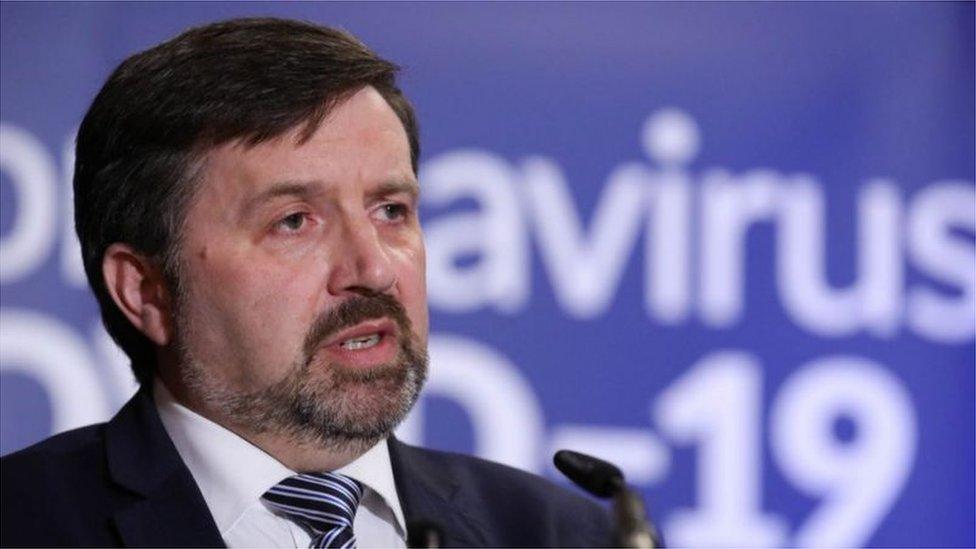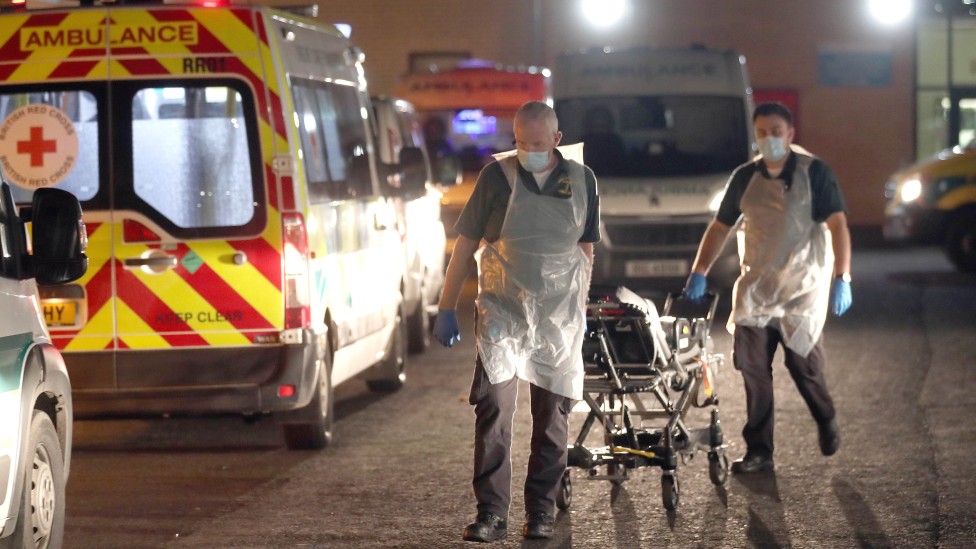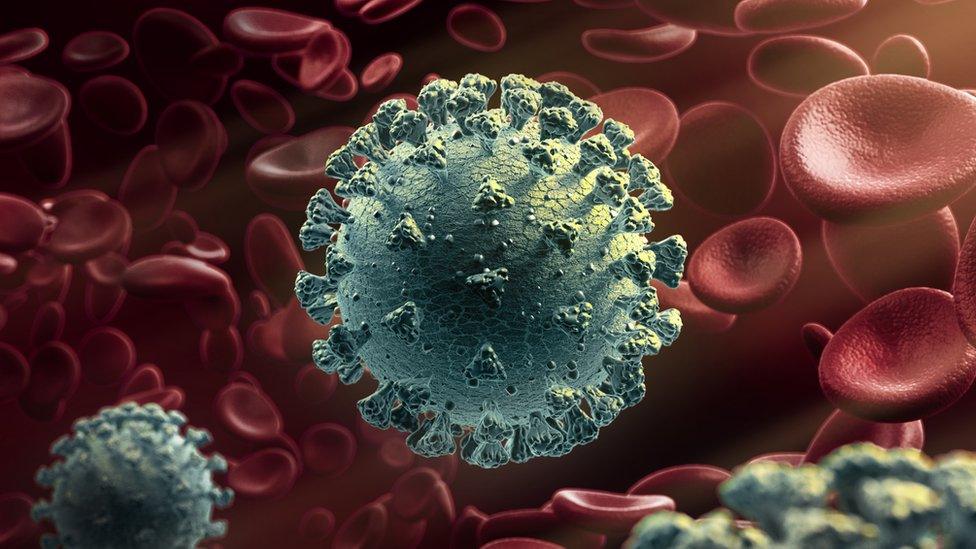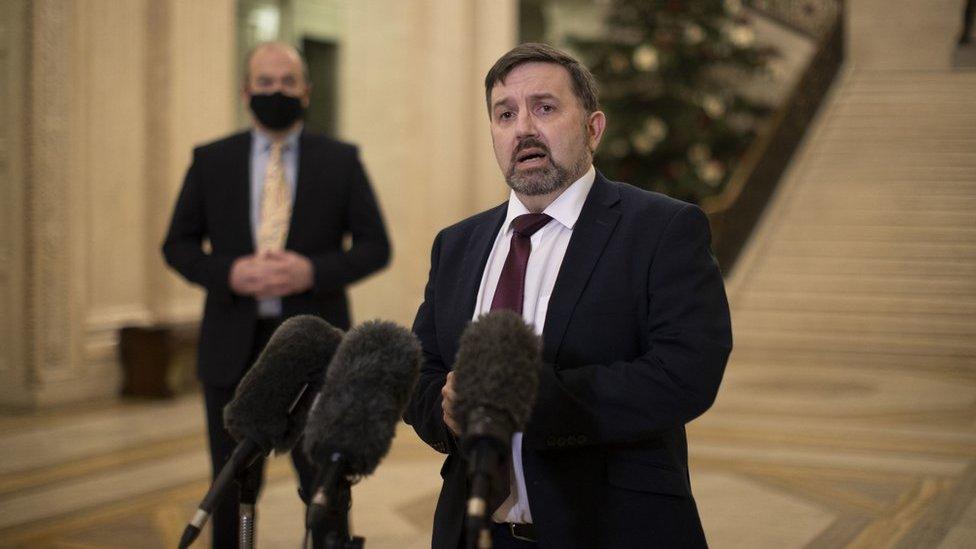Covid-19: 'Significant rise' in new cases among young adults in NI
- Published

Robin Swann has called on the public to 'redouble efforts' to push down infection rates
There has been a "significant rise" in Covid-19 cases, particularly in younger adults aged from 20 to 39, Northern Ireland's health minister has said.
A further 14 coronavirus-related deaths have been recorded and 1,566 people tested positive in the past 24 hours.
It is the highest daily total of new cases since tests began but may include samples taken over the past week.
Robin Swann said a month ago the 20-39 age group accounted for 27.5% of cases but this has now risen to 41.5%.
"The rise in this age group may be linked to behaviour and although young adults may think they are immune to Covid-19, their relatives and loved ones are not," the minister said.
"We must all redouble our efforts to push down infection rates. That does not mean some people must make sacrifices and restrict their lives while others do not."
'Third surge'
The 14 deaths reported on Tuesday take the Department of Health's overall death toll to 1,305.
Thirteen of those deaths occurred from Monday while the other death happened on another date.
Mr Swann warned that Northern Ireland's health service is going to be "under severe pressure" over the next few weeks and he called on people not to bring the infection home to their loved ones.

Earlier this month, some patients were treated in ambulances outside hospitals as Emergency Departments struggled with Covid pressures
Separately, a third surge of Covid-19 cases is expected in the middle of January, according to the chair of the British Medical Association (BMA) in Northern Ireland.
Dr Tom Black warned that more cases of a new variant of coronavirus are likely to be seen in the next few weeks, as is now happening in parts of England.
But he said that as more people are vaccinated, there should be some improvement in February and March.
"We would expect to see a peak of hospital admissions and demands in probably the second and third week in January," Dr Black told BBC News NI.
"Hopefully, we will keep the pressure off the intensive care units because that's a real bottleneck with patient care and with the vaccination hopefully we'll see some improvement in February and March."
Wendy Magowan, director of operations at the Northern Health Trust, said it had been "quite a difficult Christmas weekend".
She said Antrim Area Hospital, with 99 Covid-19 inpatients, had the highest number in NI, while there were 25 in Causeway Hospital.
"The Covid inpatient numbers really have not abated, particularly on the Antrim site, since early November, so we are not seeing a downturn," she said.
Ms Magowan told BBC News NI that staffing levels had been depleted due to community transmission of the virus and track-and-trace self-isolation directives.
"We have had to call on other colleagues over the last couple of days," she said, including help with ambulance call-outs from other health trusts.
"All acute hospitals are planning for this further surge in activity which we probably expect in mid-January, so for us, what we can expect is actually up to double the figures that we have currently."
Covid-19: Care home residents 'all been offered the vaccine'
Roisin Coulter, the lead director for the rollout of the Covid-19 vaccine programme for the South Eastern Trust, said the rollout "has given us hope for managing the third surge of Covid which we all know is going to come in mid-January".
"This is one of the key enablers to help us protect the most vulnerable, our patients and our clients and our staff, therefore hopefully reducing the demand on our hospital services."
Six-week lockdown
On Monday, Mr Swann warned the public that house parties to mark New Year's Eve could be "super-spreader" events for coronavirus.
Northern Ireland is currently in a six-week lockdown, with strict restrictions in place.
During the first week of the lockdown, which started on 26 December, no gatherings - indoor or outdoor - are permitted between 20:00 GMT and 06:00 each day.
The Police Service of Northern Ireland (PSNI), which is helping to enforce the restrictions, confirmed on Tuesday that 394 of its officers and staff are off work due to the coronavirus; 314 of whom are self-isolating.
Meanwhile, Derry City and Strabane District Council is to ask the Stormont Executive to reconsider the decision to keep Northern Ireland's airports open.
Councillors voted in favour of writing to ministers, asking them to share the medical advice the executive received about the operation of airports.
Council officers have also been asked to bring forward a report on the implications of City of Derry Airport operating for essential workers only.
'A bit of hope'
In the Republic of Ireland, 79-year-old Annie Lynch has become the first person in the country to receive the Covid-19 vaccine.
The grandmother of 10, from Dublin, said she was "very privileged" and felt like "there is a bit of hope there now", Irish national broadcaster RTÉ reported.
The Department of Health in the Republic of Ireland has been notified of nine more coronavirus-related deaths and 1,546 new cases of the disease.
This is the highest number of new infections reported in a single day since the pandemic began.
Related topics
- Published20 December 2020

- Published28 December 2020

- Published26 December 2020
